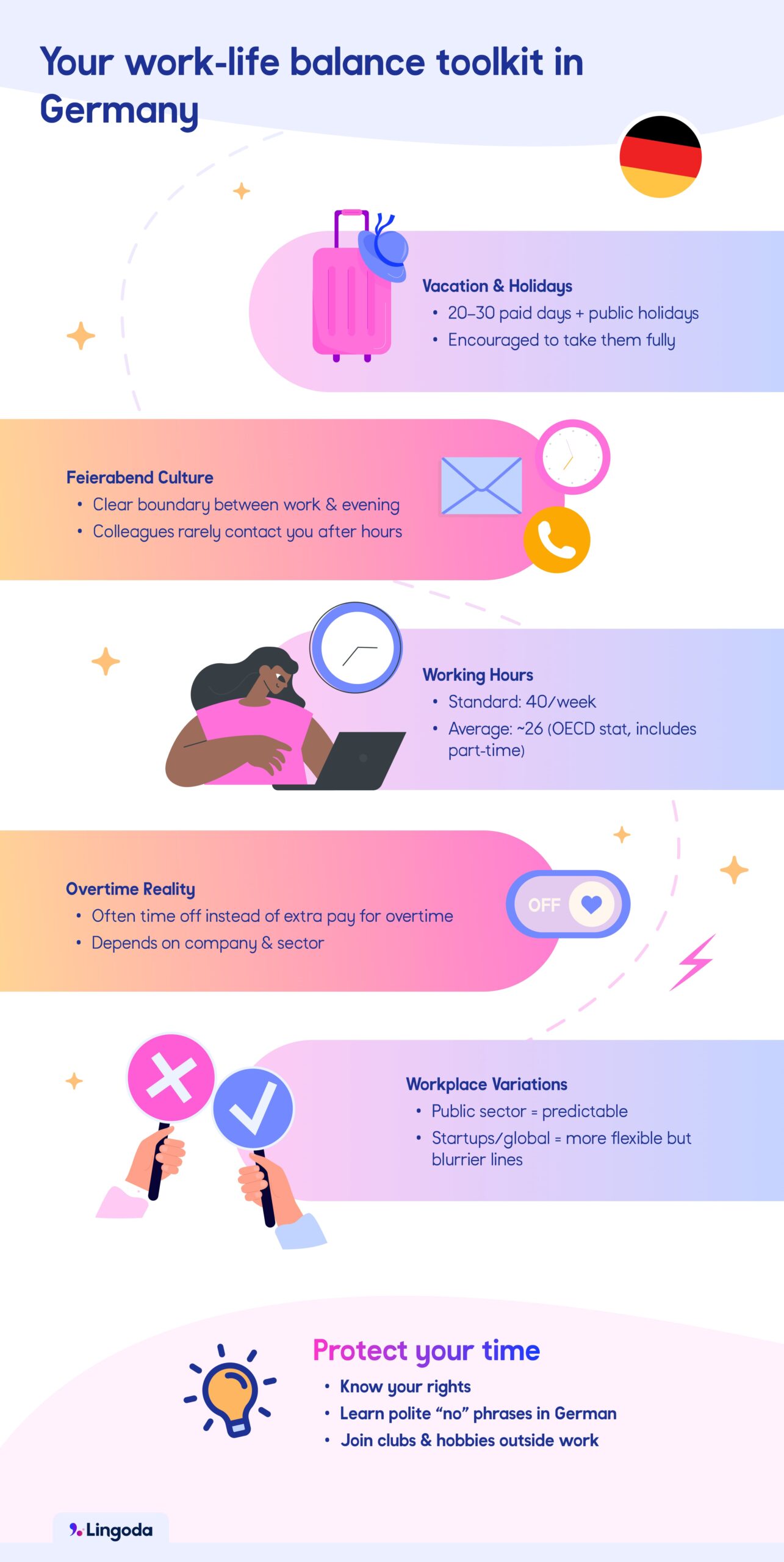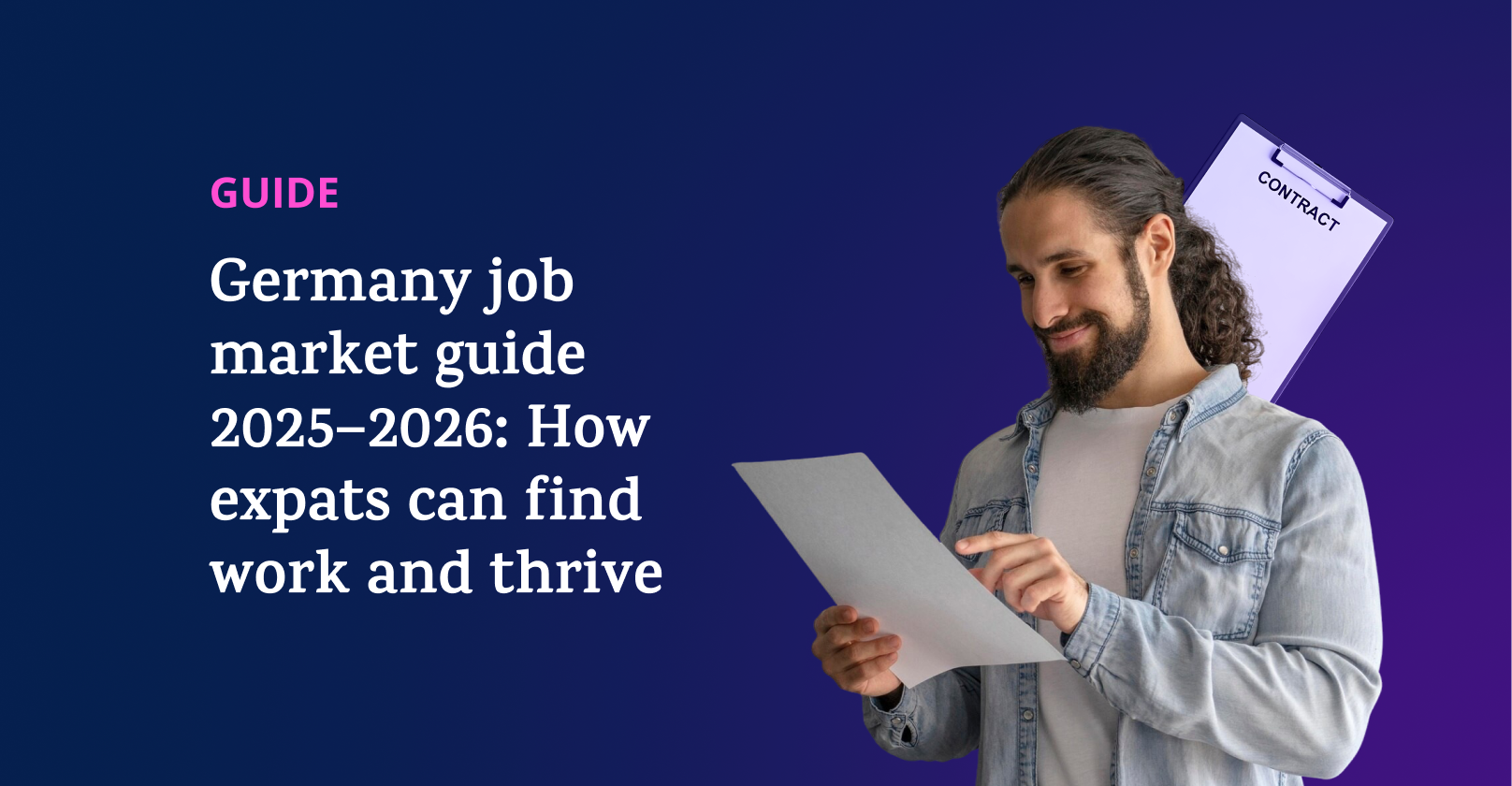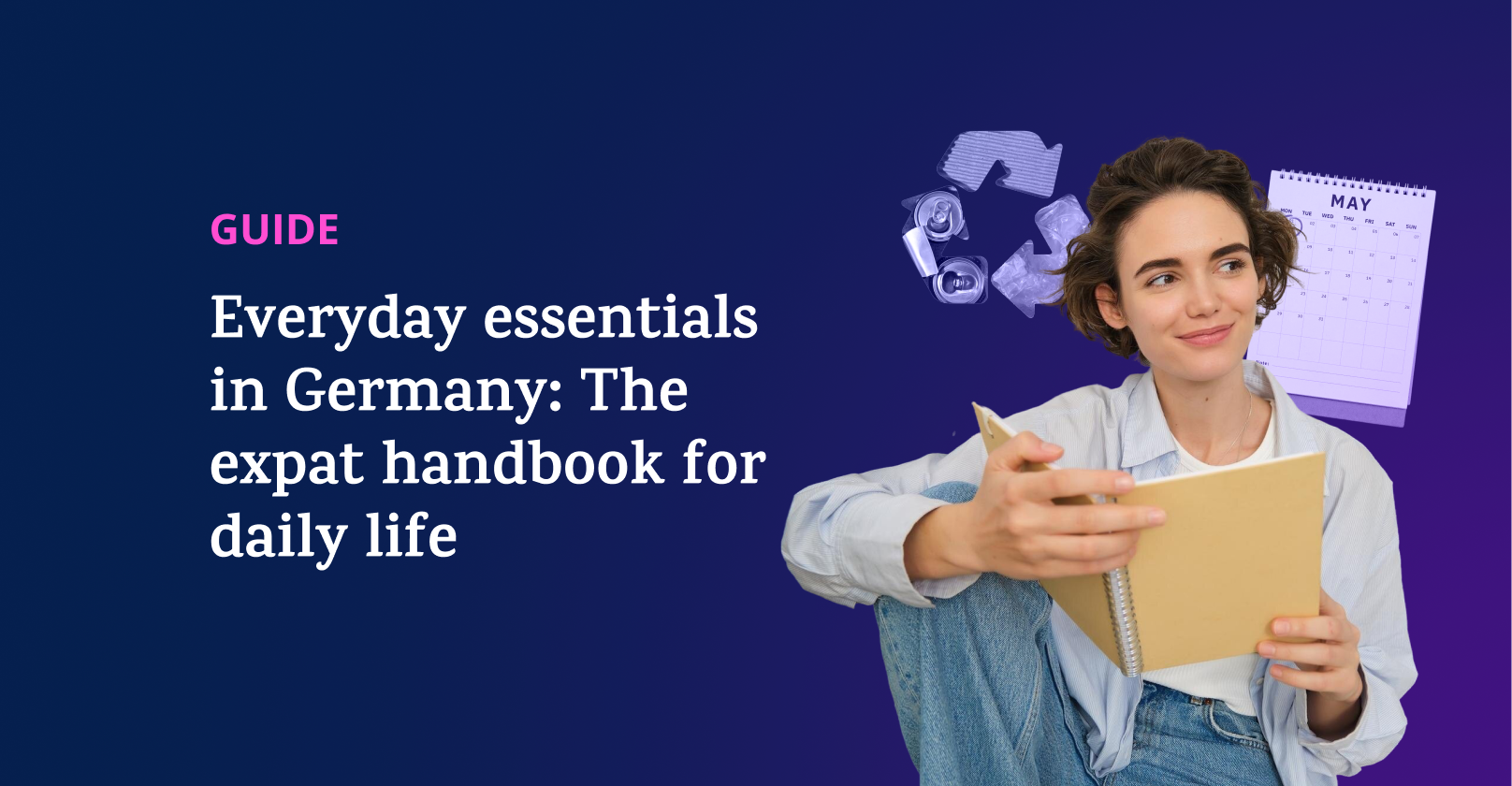Is Germany’s famous work-life balance real? Myths vs. reality
It’s 4 p.m. on a Tuesday, and while you’re staring at your inbox, somewhere in Germany a group of friends is already clinking beer glasses in a sunny Biergarten. This scenario neatly encapsulates what the rest of the world thinks of German work-life balance: short days, long evenings and plenty of time to recharge. But how much of this reputation is reality, and how much is just wishful thinking?

Let’s take a closer look at work-life balance in Germany and try to separate fact from fiction. We’ll tell you all you need to know, whether you’re contemplating an imminent move to Germany or still grinding away where you are, hoping to achieve this famed balance for yourself one day.
Quick facts about work-life balance in Germany
- Average annual working hours: ~1,340 (OECD)
- Legal minimum vacation: 20 days (most get 28–30)
- Cultural norm: Feierabend = no work after hours
- Exceptions: Global companies, startups and certain other industries
Where does Germany’s work-life balance reputation come from?
Germany’s perk-filled work culture is rooted in decades of labor protections, generous vacation policies and a devotion to the Feierabend (the sacred boundary between daytime work and evening leisure).
Full-time workers in Germany are legally obligated to take at least 20 days of paid vacation, topped by up to 12 public holidays depending on the state in question. Germany’s strong labor laws also impose mandatory rest periods and limits on working hours.
The effect of such laws shows through in the numbers. According to the Organization for Economic Co-operation and Development (OECD), Germans clock around 1,340 hours per year. That’s an average of 26 hours per workweek, placing Germans among the least overworked populations measured by the OECD.
German companies — and the culture in general — tend to draw clear boundaries between work and personal life. Rest and recovery are often seen as aspirational values, rather than mere obstacles to profit. With that said, different companies may have different policies, and the story told by the overall statistics can be misleading. Most full-time jobs in Germany still entail the same 40-hour work week typical of other developed economies in the West.

What newcomers actually experience at work
Germany’s reputation for worker-friendliness rings true for many — but certainly not all — of the country’s workers. There can be big differences in the policies between large, multinational corporations and smaller mom-and-pop shops. Startups belong in a category of their own, as many attempt to balance demanding expectations with more unconventional ways of working, such as a four-day work week with flexible hours or the option to work from home.
Your work-life balance may also depend on other factors, such as the branch you’re working in and how much time you’re expected to work. The famed Mittelstände (mid-sized companies) are often characterized by steadier hours and strong employee loyalty, while public sector roles are the holy grail for predictable schedules and generous leave.
Although every company is legally obligated to guarantee workers 30 paid days off, unspoken rules in some workplaces may actually lead to longer working hours without paid overtime. Many newcomers start working for global companies, often due to the language barrier. They often find themselves working longer hours. Additionally, meetings with coworkers in other time zones can interfere with that 4 p.m. Feierabend, as a few choice gripes from Reddit make clear:
“My boss expects replies at night.”
“I love my 6 PM Feierabend.”
One thing to watch out for is the language barrier. If you’re new to German, pushing back on after-hours expectations can feel intimidating. Knowing the polite-but-firm ways to say “no” might be as valuable as your first paycheck.
Surprises and cultural shocks in the German workplace
In some workplaces, especially more traditional ones, clocking out before your boss leaves might earn you side-eye — even if your contract technically allows it. Hierarchy remains at the center of many German workplaces, and your manager’s personal attitude can shape your actual work–life balance more than anything in the HR handbook.
Moreover, regional contrasts can be stark. Some Berlin startups might embrace flexible hours, casual dress and team beers at 4 p.m., while a lot of Bavarian family businesses lean towards formality, fixed hours and long-term loyalty.
5 surprises about German work culture
- Feierabend is a real boundary – Many people truly disconnect after work.
- Hierarchy can extend your day – In some offices, staying later than necessary is the norm.
- Regional culture matters – Work styles vary greatly between German states.
- Policy ≠ practice – What’s written in your contract may differ from daily reality.
- Startup contrasts – From four-day weeks to weekend hustle, the experience can be wildly different.
The takeaway? Observe the office culture closely, and seek out online reviews from current and former workers at the company beforehand. What’s written in policy isn’t always what’s practiced.
How to protect your ‘Feierabend’ in Germany
The protection of labor rights is an hallowed aspect of Germany’s culture. Still, you must know your rights to be able to protect them.
With at least 20 to 30 days of paid leave guaranteed by law, taking your vacation isn’t seen as slacking off; on the contrary, it’s a normal and healthy part of working life. Colleagues will expect you to use it, and nobody will raise an eyebrow when you do.
Protecting your evenings can be trickier, especially if you work in an international team. That’s where mastering polite ways to say “no” becomes important. Strong German skills can make it easier to set boundaries without sounding abrupt, and you’ll soon notice that many colleagues treat Feierabend as a sacred rite. For the most part, once the workday ends, they switch off completely.
[H3] 5 practical ways to protect your ‘Feierabend’
- Use your full vacation allowance – It’s part of the culture to take your days off.
- Set clear after-hours boundaries – This is especially important if you work across time zones.
- Learn polite “no” phrases in German – This keeps the tone firm but friendly.
- Fill your evenings with hobbies or social activities – Cycling, club events or a simple beer with friends can help you recharge and give you a sense of belonging.
- Know your workplace rights – A Betriebsrat (works council) or union can offer extra support.
So… Is Germany’s work-life balance real?
As with most things in life, it’s not possible to make a clear, definitive statement about work-life balance in Germany. But there are many positive examples that led to this reputation, and many of them remain in place today. Strong labor laws, generous vacation allowances and the cherished idea of Feierabend are all evidence that Germany’s work-life balance is far more than mere myth.
Yes, many people do indeed clock off early — if their role and workload allow it. In some larger or more globally oriented companies, unspoken rules or demanding clients can blur the boundaries. Ultimately, your work-life balance in Germany depends as much on your job and industry as on your willingness (and ability) to set boundaries. The myth isn’t false, but it’s not universal.
How many vacation days do Germans really take?
Full-time employees have at least 20 paid vacation days by law, but many companies offer 28 to 30 and expect their employees to actually take them.
Is overtime paid in Germany?
Many jobs offer time off instead of extra pay, and some contracts exclude overtime pay altogether.
Can I say no to my boss in Germany?
If the request goes beyond your agreed hours or duties, you are free to decline politely.
Finding your own balance
While every company has its own policies, strong labor laws and a cultural awareness for boundaries between work and private life are here to support you in your mission to enjoy your Feierabend.
Furthermore, your language skills and cultural know-how will help you navigate expectations and set boundaries. It’s important to learn how to ask for what you need and want — not just for your own sake, but for your boss’s, as well. Happy employees usually work harder, deliver better results and don’t leave immediately when the next opportunity comes along.













